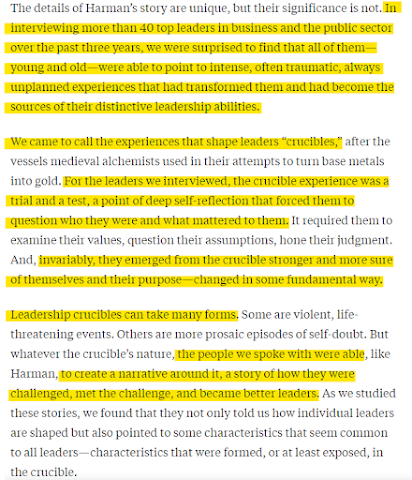The Crucible (Not the Book)
There’s this idea we hold on to, that everything we’ve been through has to be for a greater purpose.
That our lives are filled with these tiny breadcrumbs or little Easter eggs like in a good TV series. And that when we reach the end, they’ll all make sense.
I don’t know how true that is. I remember after my brother’s passing, in addition to the usual words of sympathy, some people said:
This is a terrible thing that happened, but it happened because God knows that you can handle it—that you’ll be strong for your family and that you’ll ultimately be stronger for it.
In college, when we would do interview prep, the first question we would practice was: Tell me about yourself.
We were told to “tell a story.” To talk about how what we were currently doing and past events in our life shaped our future outlook.
Sometimes I just wanted to throw up my hands and shout:
I don’t know! I’m not the showrunner; I’m just a character.
In my leadership class, we discussed the concept of locus of control. This is the degree to which people believe that they, as opposed to external forces, have control over the outcomes in their lives.
Leaders supposedly have an internal locus of control, believing that they can shape their outcomes through their actions. Those with an external locus of control see these external forces as primarily contributing to their outcomes.
As an illustration of this concept, we read an HBR article called the Crucibles of Leadership.
In examining the lives of successful people, the authors found that many had experienced something traumatic in their lives but were able to find meaning in those events—meaning that guided them throughout their careers:
Perhaps the authors’ observations are significant. Maybe the fact that a successful person had a traumatic thing happen to them (and responded relatively well to it) was a contributing factor to their success.
Or maybe there were a million other factors—be they pre-existing personality traits, inherent privileges, or simple randomness—that weren’t necessarily influenced by this event or their response.
We don’t know the balance of the trauma vs. the silver linings that came from it.
And we each only have one life, so it’s impossible to control for that one event and see if the final outcome would have turned out any differently.
If the idea of a crucible that makes you stronger is comforting to you and helps you to process your trauma, then I commend that. I personally am not sure. I am still figuring it out, but that’s what this journey is all about.
Zac




Comments
Post a Comment